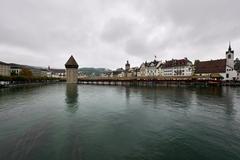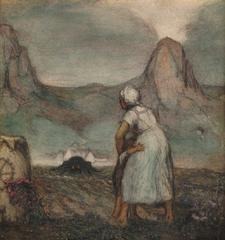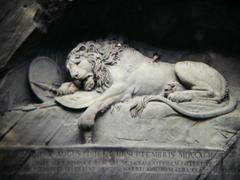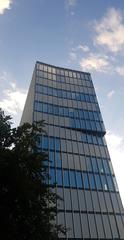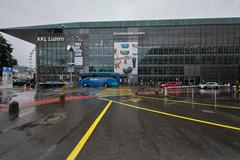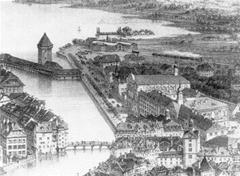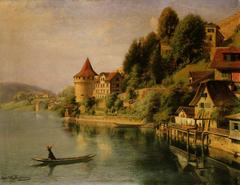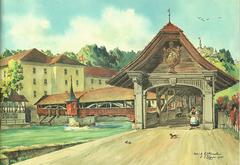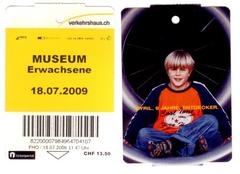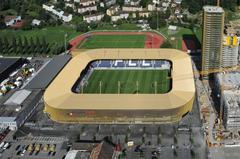
University of Lucerne Visiting Guide: Hours, Tickets, Accessibility, and Tips
Date: 14/06/2025
Introduction: Experience the University of Lucerne
Centrally located in the picturesque Swiss city of Lucerne, the University of Lucerne stands as a modern academic institution deeply rooted in centuries of history. What began in 1574 as a Jesuit College has, over the centuries, evolved into a vibrant university, officially established in 2000. Today, it is Switzerland’s smallest university, renowned for its interdisciplinary approach, personalized learning environment, and commitment to research and innovation (University of Lucerne History).
The university is more than an academic hub—it is a gateway to exploring Lucerne’s rich architectural heritage, cultural landmarks, and scenic lakeside vistas. Situated just steps from the city’s main railway station, the campus is easily accessible and welcomes visitors during regular business hours. This guide provides everything you need to know about visiting the University of Lucerne, from practical details on hours and accessibility to highlights of nearby attractions and essential travel tips.
Table of Contents
- History of the University of Lucerne
- Academic Profile and Student Life
- Visitor Information: Hours, Tickets, and Accessibility
- Lucerne Historical Sites Near the University
- Getting to and Around Lucerne
- Guided Tours, Events, and Photographic Spots
- Practical Visitor Tips
- Frequently Asked Questions (FAQ)
- Conclusion and Further Resources
- Sources
History of the University of Lucerne
From Jesuit College to Modern University
- Origins (1574–19th Century): Founded as a Jesuit College at the behest of Charles Borromeo after the Reformation, Lucerne became a center for theological and philosophical studies, laying the foundations for today’s university (Wikipedia; University History).
- 20th Century Expansion: In 1938, the institution was granted the status of a theological faculty, with degree-awarding rights following in 1970. Despite setbacks in the 1978 referendum, new departments—including Philosophy and Humanities—were added through the 1980s and 1990s.
- Modern University (2000–Present): The pivotal University Act of 2000, approved by local citizens, officially established the University of Lucerne. Recognition by the Swiss Federal Council came in 2005, and the university moved into its current modern campus in 2011.
- Growth and Milestones: Recent decades have seen the addition of faculties in Economics, Health Sciences, and Psychology, as well as international research collaborations. In 2025, the university celebrated its 25th anniversary with a public exhibition marking key moments in its development (University History).
Academic Profile and Student Life
Structure and Programs
- Faculties: Theology, Humanities and Social Sciences, Law, Economics and Management, Health Sciences and Medicine, Behavioural Sciences and Psychology.
- Student Body: Around 4,800 students, making it Switzerland’s smallest university and allowing for a personalized, interdisciplinary academic atmosphere (coursesdata.com).
- Degrees: Bachelor’s, Master’s, and Doctoral programs aligned with the Bologna Process (shanghairanking.com).
- Interdisciplinarity: Students can combine subjects across faculties, fostering innovation and adaptability (goldenfuture.education).
Research and Reputation
- Recognized for strengths in humanities, social sciences, law, and health sciences.
- Internationally connected, with over 6,200 publications and 77,000 citations (edurank.org).
- Ranked 18th in Switzerland and 2,280th globally as of 2025.
Campus Life
- Facilities: Modern campus at Frohburgstrasse 3, with a spacious library, canteen, student shop, and accessible facilities.
- Community: Vibrant international student life, academic clubs, cultural events, and recreational activities (unilu.ch - International Students).
- Location: Adjacent to Lucerne’s main railway station and near the KKL concert hall, with easy access to Lake Lucerne and the city center.
Visitor Information: Hours, Tickets, and Accessibility
Visiting Hours
- Campus: Open to the public Monday to Friday, 8:00 AM–6:00 PM.
- Library: Monday–Friday, 8:00 AM–8:00 PM; Saturday, 9:00 AM–5:00 PM.
- Cafeteria: Monday–Friday, 7:30 AM–4:00 PM.
- Special Events: Guided tours and exhibitions are scheduled periodically; check the university website for details (University of Lucerne Visiting Information).
Tickets and Admission
- General Access: Free; no tickets required for campus entry.
- Guided Tours/Events: May require advance booking and a nominal fee. Contact the university or check the events calendar for availability.
Accessibility
- Campus: Fully wheelchair-accessible with ramps, elevators, and accessible restrooms.
- City: Lucerne’s public spaces, transit, and attractions are designed for barrier-free access. More details at Luzern.com - Accessibility.
Lucerne Historical Sites Near the University
Within walking distance of the campus, Lucerne’s historical sites provide a perfect complement to your university visit:
- Chapel Bridge (Kapellbrücke): A 14th-century wooden bridge adorned with historic paintings. Open 24/7, free entry.
- Musegg Wall (Museggmauer): Medieval city wall with towers, open daily (seasonal hours), free entry.
- Lion Monument (Löwendenkmal): Striking rock sculpture, open year-round, free.
- Jesuit Church: Baroque church on the Reuss River, open daily, free.
- Old Town (Altstadt): Historic squares, medieval buildings, and markets.
- Spreuer Bridge: Historic wooden bridge with “Dance of Death” paintings, open 24/7.
For more details on these attractions, visit the Lucerne Tourism Top Sights page.
Getting to and Around Lucerne
Arriving in Lucerne
- By Train: Direct trains from Zurich, Bern, and Basel. The campus is a 5–10 minute walk from Lucerne’s main station (Luzern.com - Arriving by Train).
- By Coach: Main bus park is a short walk from the campus.
- By Car: Accessible via Swiss motorways; parking is limited and paid.
- By Air: Zurich Airport is about one hour away by direct train.
Local Transport
- Public Transport: Efficient buses and trains cover the city. The university and major sites are within Zone 10 (In Your Pocket - Lucerne Public Transport).
- Special Passes: Swiss Travel Pass, Tell-Pass, and Visitor Card Lucerne offer unlimited travel and discounts (Luzern.com - Visitor Card).
- Biking/Walking: Lucerne is compact and walkable, with bike rentals available (Luzern.com - Nextbike).
Guided Tours, Events, and Photographic Spots
- Guided Tours: Available during open days and special events; otherwise, self-guided exploration is encouraged.
- Events: The university hosts public lectures, concerts, and exhibitions. Check the events calendar for schedules.
- Photo Opportunities: Capture the university’s modern architecture, lake views, and historic cityscape from the campus and surrounding landmarks.
Practical Visitor Tips
- Luggage Storage: Use the Bounce network for secure storage (Luzern.com - Luggage Storage).
- Health & Safety: Lucerne is very safe; in emergencies, dial 112/117 (police), 118 (fire), or 144 (ambulance) (Hikersbay - Lucerne Safety).
- Weather: Best visited May–September; winters are scenic, especially for mountain trips (Hikersbay - Best Time to Visit).
- Language & Currency: German is primary; English widely spoken. Currency is Swiss Franc (CHF).
- Wi-Fi: Free at the university and many public spaces.
- Advance Contact: For tours or meetings, contact the university in advance (University of Lucerne Contact).
- Accommodation: Options range from hotels to hostels; book in advance (Hikersbay - Hotels in Lucerne).
Frequently Asked Questions (FAQ)
Q: What are the University of Lucerne visiting hours?
A: Monday to Friday, 8:00 AM–6:00 PM. Library and cafeteria have separate hours.
Q: Do I need tickets to visit?
A: General entry is free; some tours or events require tickets—check ahead.
Q: Is the campus accessible for visitors with disabilities?
A: Yes, the university is fully accessible.
Q: How do I get to the university?
A: It’s a short walk from Lucerne’s main train station, with excellent public transport links.
Q: What historical sites are nearby?
A: Chapel Bridge, Musegg Wall, Lion Monument, Old Town, and Jesuit Church are all within walking distance.
Conclusion and Further Resources
The University of Lucerne offers a distinguished academic environment set against the backdrop of one of Switzerland’s most beautiful cities. Free general admission, a welcoming atmosphere, and its proximity to Lucerne’s historic landmarks make the university an outstanding destination for visitors of all backgrounds.
For the latest updates on visiting hours, tours, and events, consult the University of Lucerne Official Website. Enhance your trip with tools such as the Audiala app, which provides guided campus and city tours. For broader travel information, visit the Lucerne Tourism Official Site.
Sources
- University of Lucerne – History Overview, 2025, University of Lucerne Official Website
- University of Lucerne Visiting Information, 2025, University of Lucerne Official Website
- Lucerne Tourism – Top Sights, 2025, Lucerne Tourism Official Website
- Luzern.com Accessibility and Transportation, 2025, Lucerne Tourism Official Website
- Wikipedia – University of Lucerne, 2025

